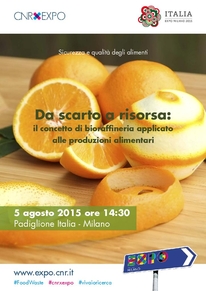From waste to resources: Biomasses and biorefineries for food and non-food productions

Coordinator: Nicoletta Ravasio
Institute of Molecular Science and Technologies (ISTM)
This event aims to show how the “circular economy” concept can be applied to the agri-food industrial sector. Thus, food supply chain waste (FSCW) ca be used as raw materials to produce a number of materials with various added value. A very different approach from the one involving only the production of energy for the valorization of waste and residues.
Many possibilities can be envisaged. Bio-active compounds can be extracted from many residues and used as food additives, nutraceutical compounds or cosmetic ingredients, but the challenge is to get commodities such as hydraulic fluids, surfactants or plastics that, due to their renewable origin would be fully biodegradable.
Moreover some waste have also a negative impact on the environment and therefore it is worth finding an alternative use for them. Let’s think about rice straw that is commonly tilled back into the soil from the farmer to avoid disposal costs. This practice generates 60 kg of methane (90 mc!!!) per ton of straw and accounts for 10-15% of the global anthropogenic emissions of this green-house gas.
Research is focused on some specific productive chain: fruit juice, rice, dairy, bread and baking products, tomato and wine. During the event the first interactive map of food supply chain wastes in Europe, organized both by country and by waste, will be presented. Starred chef Igles Corelli, inventor of the “Circular cooking” concept, will show interesting uses of kitchen wastes.
The event is co-organized by COST (European cooperation in science and technology) Action EUBis: Food waste valorisation for sustainable chemicals, materials & fuels. The overall aim of EUBis is to bring about a critical mass of researchers and stakeholders to harness the potential of Food Supply Chain Waste as an alternative carbon source to produce commercially viable chemical commodities.








